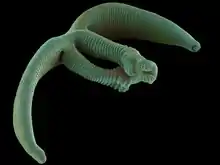Diplozoidae
Diplozoidae is a family of monogeneans in the order Mazocraeidea.[2] In all species of this family, the bodies of the two hermaphroditic members of a couple are permanently fused for life. These monogeneans are parasitic on the gills of freshwater fish. [3]
| Diplozoidae | |
|---|---|
 | |
| Eudiplozoon nipponicum | |
| Scientific classification | |
| Kingdom: | |
| Phylum: | |
| Class: | |
| Order: | |
| Family: | Diplozoidae Palombi, 1949[1] |
Genera
- Afrodiplozoon Khotenovsky, 1981[3]
- Diplozoon von Nordmann, 1832[4] Example of species: Diplozoon paradoxum
- Neodiplozoon Tripathi, 1960[5]
- Paradiplozoon Akhmerov, 1974.[6] Example of species: Paradiplozoon hemiculteri, Paradiplozoon yunnanense.
References
- Palombi, A. (1949). Trematodi d'Italia. Parte I. Trematodi Monogenetici. Archivio Zoologico Italiano, 34, 203408.
- WoRMS (2018). Diplozoidae Palombi, 1949. Accessed at: http://www.marinespecies.org/aphia.php?p=taxdetails&id=119241 on 2018-09-08
- Khotenovsky, I. A. (1981). Systematics and phylogeny of the families Diplozoidae and Discocotylidae (Monogenea). Parazitologyia, 30, 166–175.
- von Nordmann, A. (1832). Mikrographische Beiträge zur Naturgeschichite der wirbellosen Thiere. Berlin: G. Reimer.
- Tripathi, Y. R. (1960). Change of name of Diplotrema barbi Tripathi, 1959. Indian Journal of Helminthology, 11(1/2), 116.
- Akhmerov, A. K. (1974). New species of Diplozoon from the Amur River fishes. Trudy Gel'mintologicheskoi Laboratorii, Akademiya Nauk SSSR, 24, 5–19.
This article is issued from Wikipedia. The text is licensed under Creative Commons - Attribution - Sharealike. Additional terms may apply for the media files.